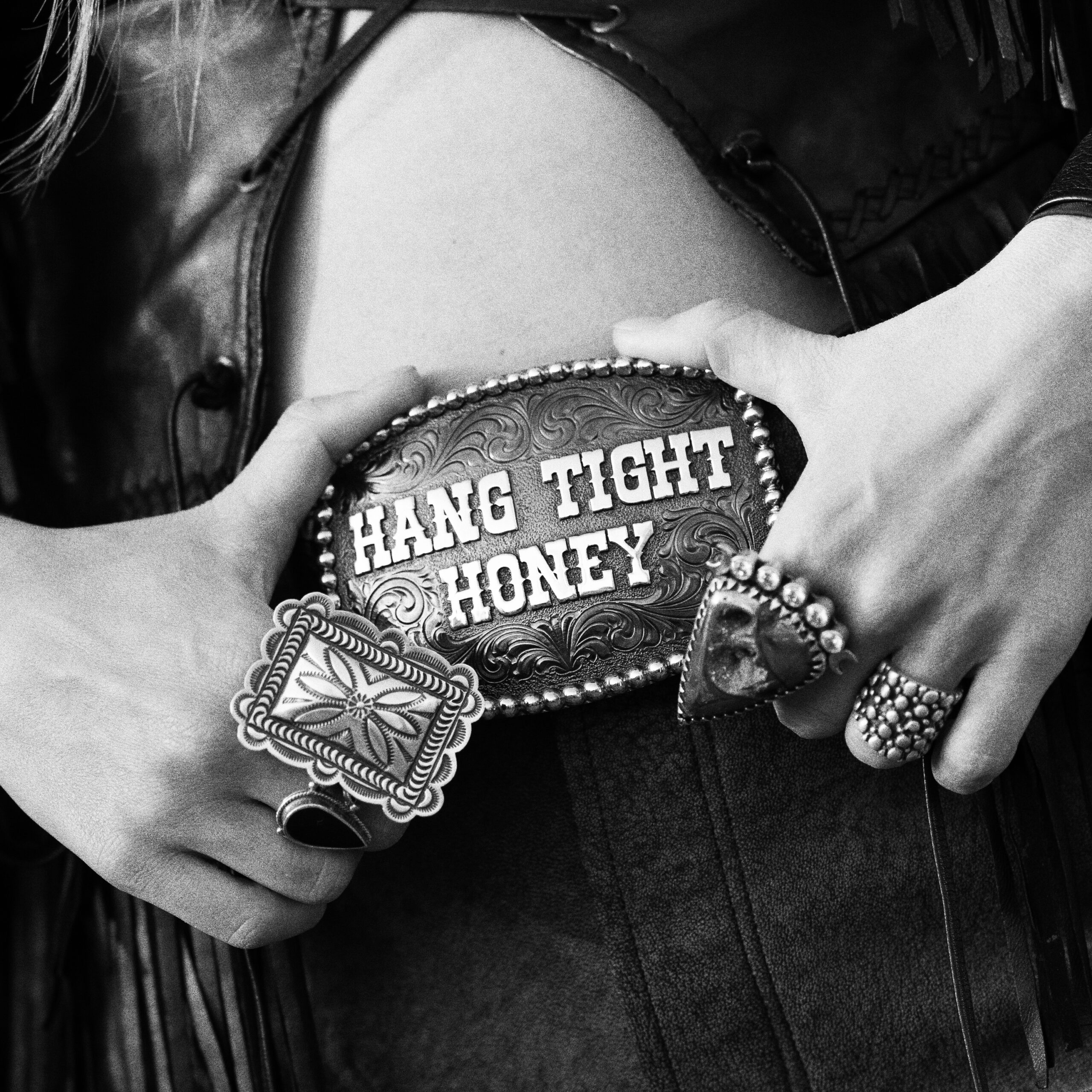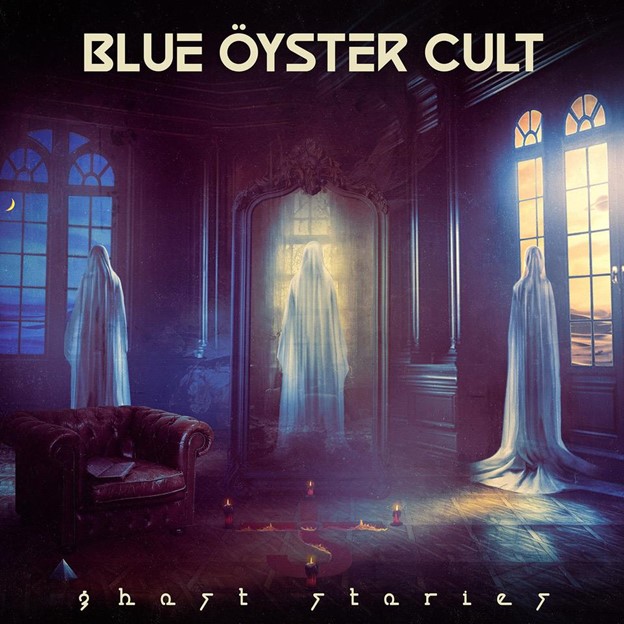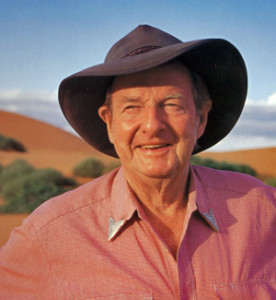 Slim Dusty is simply “The Man Who Is Australia”. In November 1986, for the occasion celebrating, for the 40th consecutive year, the collaboration between Slim Dusty and EMI Australia, the Federal Government awards him a certificate in which these words are written: “On the occasion of the dinner held on 18th November 1986 to honour Slim Dusty we, the undersigned members of the Australian Cabinet, wish to record our appreciation of his unique contribution to Australian music. To millions, his is the authentic voice of the country Australia. Long may it be heard in the land!.” This special status was granted because, through his music and his songs, he has become one of the most important cultural institutions of the Australian continent and, thanks to his cultural background, for his lifestyle, for people who have been influenced by his music and his way of being, Slim Dusty will always be identified as the iconic figure of that legendary Australia that all Australians have in their DNA, even if for some time they live in modern cities such as Sydney or Melbourne. Born in 1927 in Kempsey, a small town in New South Wales, Gordon Kirkpatrick (Slim Dusty’s real name) is forced at a young age, because of the Great Depression, to move to the nearby Nulla Nulla Creek where his family tries to run a small farm. His father David, a settler of Irish origin, in the very little free time that his job gave him, played the violin and taught the young Gordon the rudiments of country music using as a point of reference the likes of Tex Morton, Wilf Carter and Jimmy Rodgers, i.e the main artists in vogue at that time.Gordon, like many of his peers, helped his father and brothers tending the cattle but dwelled in the dream of changing his life, perhaps even becoming a country singer. At the age of 10, he wrote his first song (“The Way The Cowboy Dies”) and announced, with satisfaction, that he had now taken on the name Slim Dusty, the nickname of the Australian cowboy par excellence. His father, who apparently had that country wisdom, shared by all those who worked the earth, did not hinder the young Slim’s choice, (after all he was the one steering him towards country music) but encouraged him, allowing him to perform regularly at the local radio station (the Kempsey’s Station 2KM). Here Slim befriended another young country singer named Bobby Haberfield, who went around calling himself Shorty Ranger.
Slim Dusty is simply “The Man Who Is Australia”. In November 1986, for the occasion celebrating, for the 40th consecutive year, the collaboration between Slim Dusty and EMI Australia, the Federal Government awards him a certificate in which these words are written: “On the occasion of the dinner held on 18th November 1986 to honour Slim Dusty we, the undersigned members of the Australian Cabinet, wish to record our appreciation of his unique contribution to Australian music. To millions, his is the authentic voice of the country Australia. Long may it be heard in the land!.” This special status was granted because, through his music and his songs, he has become one of the most important cultural institutions of the Australian continent and, thanks to his cultural background, for his lifestyle, for people who have been influenced by his music and his way of being, Slim Dusty will always be identified as the iconic figure of that legendary Australia that all Australians have in their DNA, even if for some time they live in modern cities such as Sydney or Melbourne. Born in 1927 in Kempsey, a small town in New South Wales, Gordon Kirkpatrick (Slim Dusty’s real name) is forced at a young age, because of the Great Depression, to move to the nearby Nulla Nulla Creek where his family tries to run a small farm. His father David, a settler of Irish origin, in the very little free time that his job gave him, played the violin and taught the young Gordon the rudiments of country music using as a point of reference the likes of Tex Morton, Wilf Carter and Jimmy Rodgers, i.e the main artists in vogue at that time.Gordon, like many of his peers, helped his father and brothers tending the cattle but dwelled in the dream of changing his life, perhaps even becoming a country singer. At the age of 10, he wrote his first song (“The Way The Cowboy Dies”) and announced, with satisfaction, that he had now taken on the name Slim Dusty, the nickname of the Australian cowboy par excellence. His father, who apparently had that country wisdom, shared by all those who worked the earth, did not hinder the young Slim’s choice, (after all he was the one steering him towards country music) but encouraged him, allowing him to perform regularly at the local radio station (the Kempsey’s Station 2KM). Here Slim befriended another young country singer named Bobby Haberfield, who went around calling himself Shorty Ranger.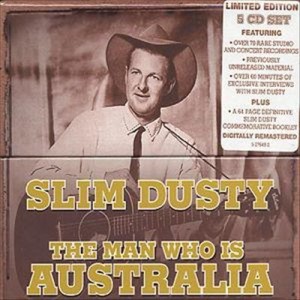 The two obviously understood each other, being of the same age, shared the same interests and had the same goal. The result was a collaboration and mutual respect destined to last forever, and in 2001, almost fifty years after that encounter, Slim paid a tribute to his friend Shorty by dedicating a tribute album called “The Man From Nulla Nulla Creek”. In order to become a professional singer, a good record deal had to be signed, so, in the late 40’s Slim went to Sydney to the Regal Zonophone, a subsidiary of Columbia, for his very first audition. The people at Regal, initially, were not really impressed, after all, this was just another farmer with a great voice who came to town seeking fortune, but when, after some time, Slim returned with a terrific song, the opinion of the record company changed dramatically and a record deal was immediately signed. The song that changed the minds at Regal Zonophone was entitled “When The Rain Tumbles Down In July”, a beautiful bush ballad that became one of the main icons of Australia alongside Ayers Rock, boomerangs and kangaroos. Having now obtained this record deal (as much as 10 pounds per song plus a lump sum for royalties) Slim, in the early 50’s, set off for his first tour along with his friend Shorty Ranger. The Slim Dusty Show started to become famous all over the country and the music industry was now ready to welcome the first album of the singer from Kempsey. In the meantime he recorded some good songs including the famous “A Pub With No Beer”, one of the best-selling songs in the history of Australian music.
The two obviously understood each other, being of the same age, shared the same interests and had the same goal. The result was a collaboration and mutual respect destined to last forever, and in 2001, almost fifty years after that encounter, Slim paid a tribute to his friend Shorty by dedicating a tribute album called “The Man From Nulla Nulla Creek”. In order to become a professional singer, a good record deal had to be signed, so, in the late 40’s Slim went to Sydney to the Regal Zonophone, a subsidiary of Columbia, for his very first audition. The people at Regal, initially, were not really impressed, after all, this was just another farmer with a great voice who came to town seeking fortune, but when, after some time, Slim returned with a terrific song, the opinion of the record company changed dramatically and a record deal was immediately signed. The song that changed the minds at Regal Zonophone was entitled “When The Rain Tumbles Down In July”, a beautiful bush ballad that became one of the main icons of Australia alongside Ayers Rock, boomerangs and kangaroos. Having now obtained this record deal (as much as 10 pounds per song plus a lump sum for royalties) Slim, in the early 50’s, set off for his first tour along with his friend Shorty Ranger. The Slim Dusty Show started to become famous all over the country and the music industry was now ready to welcome the first album of the singer from Kempsey. In the meantime he recorded some good songs including the famous “A Pub With No Beer”, one of the best-selling songs in the history of Australian music.
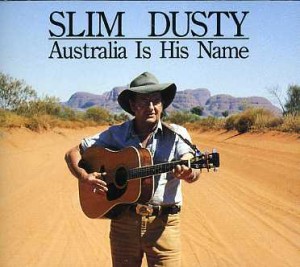 Finally in 1960 his first LP “Slim Dusty Sings” was published, the first in a long series, ( he recorded 105). This was just the beginning, the train had now picked up speed and nothing seemed to be able to stop it. This very satisfying music career took off amongst exhausting tours and hit records which topped the charts of the “Land of Oz” (one of the many nicknames given to Australia). In 1969 he set off for his first tour outside the country. New Zealand, New Guinea and the Solomon Islands all bowed to the king of country music “Down Under”, and the music of Slim also landed in Europe entering the UK charts. In 1970, Queen Elizabeth II knighted him for his services to the music industry, (the famous MBE) just as she did five years before with the Beatles. In 1973 Slim won his first two Awards (which, in Australia, are called Golden Guitar Awards), for Best Lp (Me And My Guitar) and Best Single (Lights On The Hill), starting a tradition that would see him triumph over and over again. In 2000 he recorded “Looking Forward Looking Back”. This is album number 100 of his discography, almost all of which he recorded for EMI. This very same year he was granted the honour of closing the Olympic Games in Sydney, singing “Waltzing Matilda” in world vision. Unfortunately, during this period, he was diagnosed with cancer, but still continued recording albums, which always topped the Australian charts. In 2003 he was working on his 106th album (always with EMI), but his condition was deteriorating even more and, on Sept.19th he died at his home in St Ives, New South Wales. (Gianluca Sitta)
Finally in 1960 his first LP “Slim Dusty Sings” was published, the first in a long series, ( he recorded 105). This was just the beginning, the train had now picked up speed and nothing seemed to be able to stop it. This very satisfying music career took off amongst exhausting tours and hit records which topped the charts of the “Land of Oz” (one of the many nicknames given to Australia). In 1969 he set off for his first tour outside the country. New Zealand, New Guinea and the Solomon Islands all bowed to the king of country music “Down Under”, and the music of Slim also landed in Europe entering the UK charts. In 1970, Queen Elizabeth II knighted him for his services to the music industry, (the famous MBE) just as she did five years before with the Beatles. In 1973 Slim won his first two Awards (which, in Australia, are called Golden Guitar Awards), for Best Lp (Me And My Guitar) and Best Single (Lights On The Hill), starting a tradition that would see him triumph over and over again. In 2000 he recorded “Looking Forward Looking Back”. This is album number 100 of his discography, almost all of which he recorded for EMI. This very same year he was granted the honour of closing the Olympic Games in Sydney, singing “Waltzing Matilda” in world vision. Unfortunately, during this period, he was diagnosed with cancer, but still continued recording albums, which always topped the Australian charts. In 2003 he was working on his 106th album (always with EMI), but his condition was deteriorating even more and, on Sept.19th he died at his home in St Ives, New South Wales. (Gianluca Sitta)





